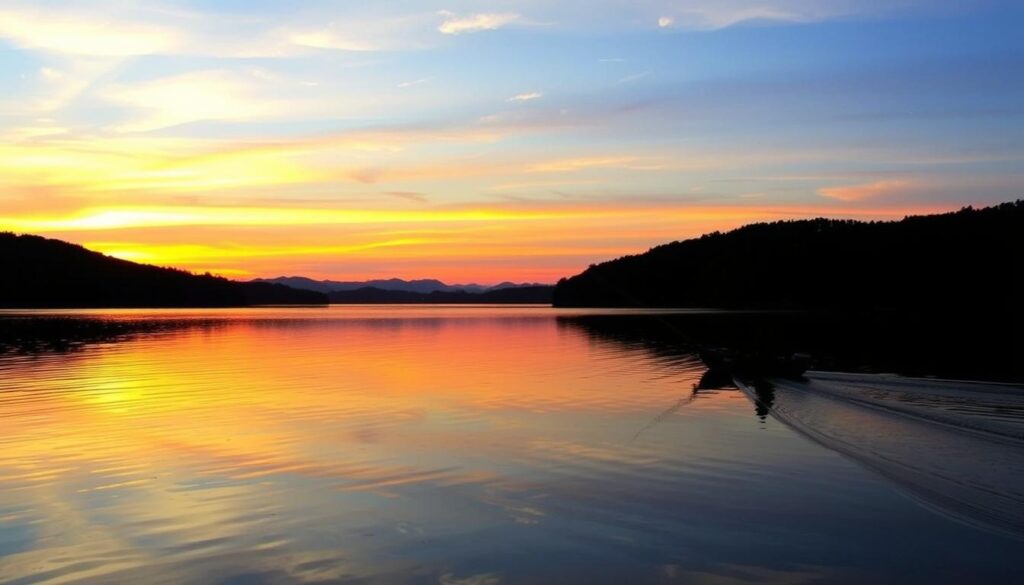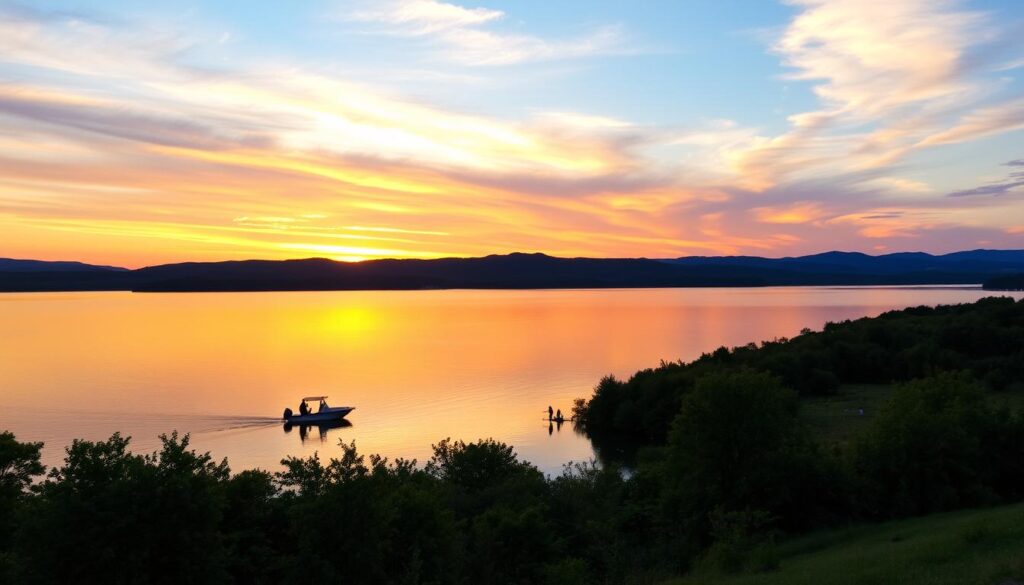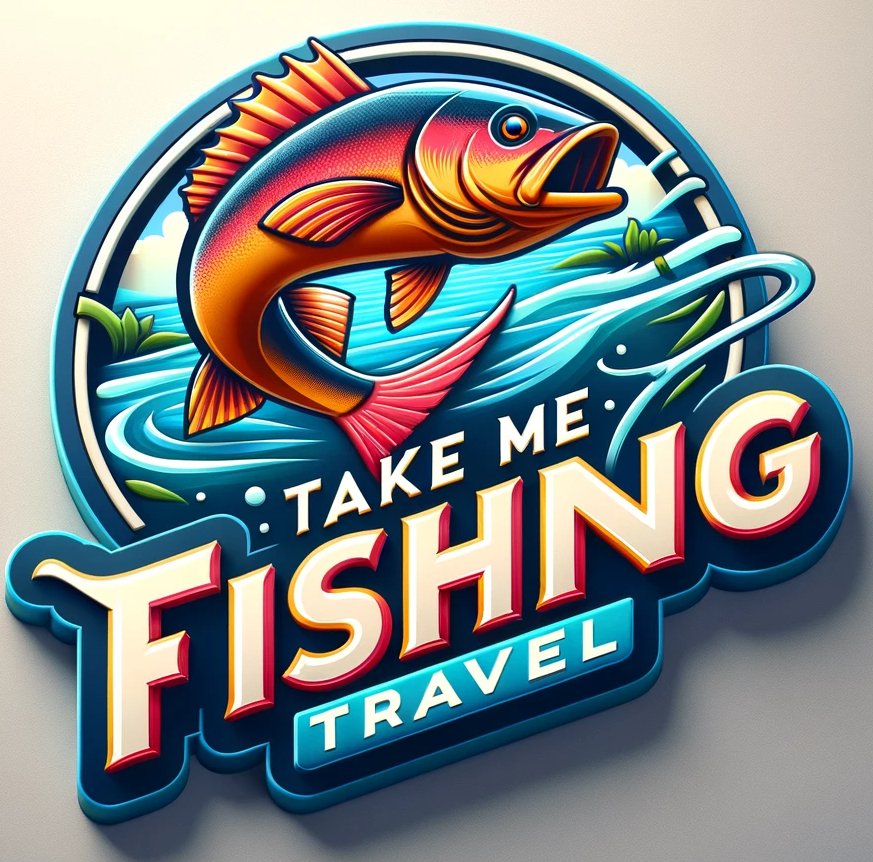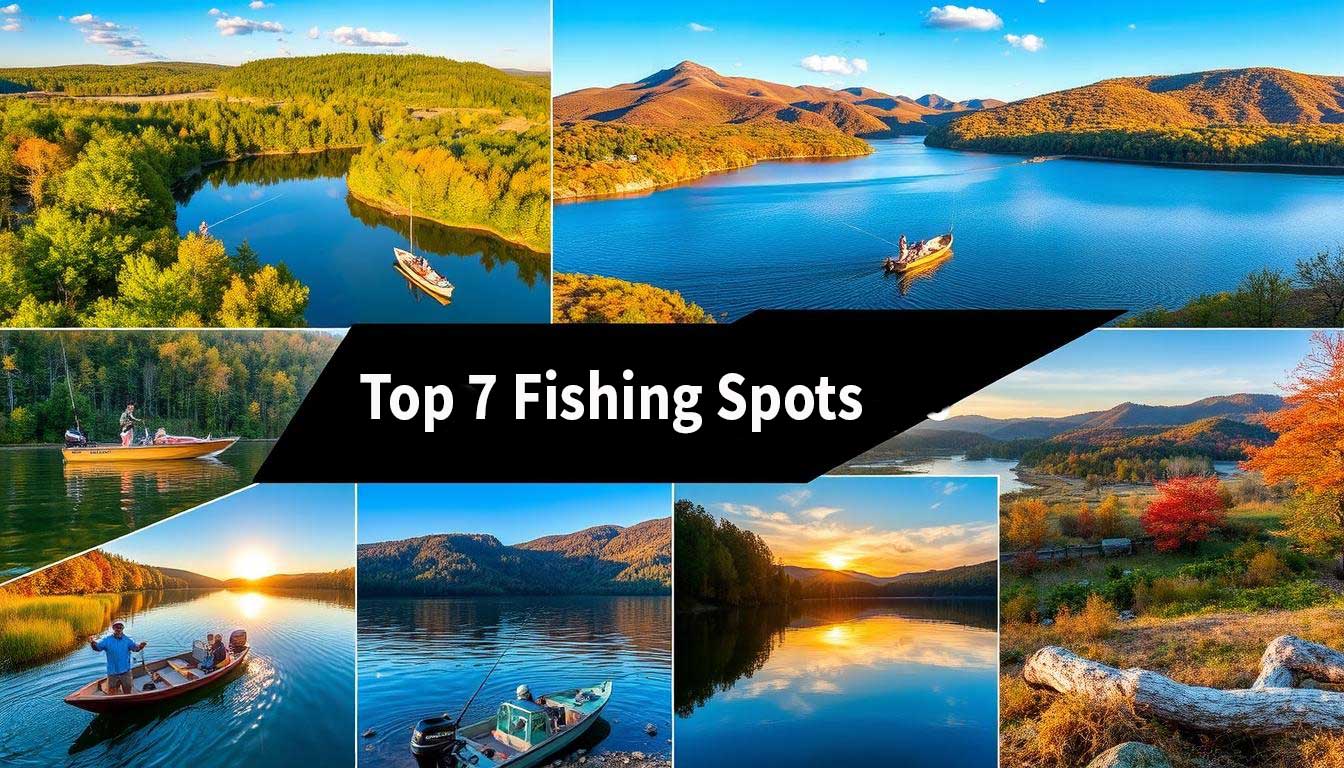This post contains affiliate links.
Imagine standing in crystal-clear water, surrounded by green hills. The sound of a brook adds to the magic. This is what fishing in Tennessee is like. It’s exciting for both experienced and new anglers.
Tennessee’s fishing scene is a treasure. It has over 22,000 miles of streams and 29 primary reservoirs. With 315 fish species, every cast is a chance to catch something special. From the Mississippi River to the Smoky Mountains, fishing here is an adventure.
Are you ready to find the 7 best fishing spots in Tennessee? Get ready for a journey to the state’s top fishing spots. You’ll find everything from crappie to trout paradises, making you want to fish right away.
Key Takeaways
- Tennessee offers diverse fishing opportunities with over 22,000 miles of streams and 29 reservoirs
- The state is home to 315 fish species, providing varied angling experiences
- Chickamauga Lake is renowned for its crappie fishing, with impressive catch rates
- Kentucky & Barkley Lakes are twin treasures for anglers seeking diverse fish populations
- The Great Smoky Mountains National Park offers over 1,000 miles of fishing waters
Introduction to Tennessee’s Fishing Scene
Ready to cast your line in the Volunteer State? Tennessee’s fishing scene is a treasure trove for anglers of all stripes. With its rich tapestry of waterways, you’re in for a treat at the prime fishing locations Tennessee has to offer.
Tennessee’s Diverse Waterways
From rushing rivers to serene lakes, Tennessee’s aquatic landscape is a fisherman’s dream. You’ll find exceptional Tennessee fishing places teeming with various species, including the state fish – the feisty smallmouth bass.
Fishing: A Cultural and Economic Powerhouse
Fishing isn’t just a pastime here; it’s woven into the fabric of Tennessee life. The state’s commitment to the sport is evident in its support for fishing events and youth engagement programs. In fact, the Tennessee Chapter of the American Fisheries Society provided $3,000 to fund 8 fishing events across the state!
Tennessee: A Premier Fishing Destination
What sets Tennessee apart? It’s the perfect blend of natural beauty and angling opportunity. With a 100% Weather Guarantee offered by many guide services, you can fish year-round. Whether you’re after walleye, musky, or crappie, Tennessee fishing hotspots have got you covered.
| Fishing Trip Type | Duration | Starting Price |
|---|---|---|
| Walleye Fishing | 4-7 hours | $190 |
| Musky Fly Fishing | 6-8 hours | $350 |
| Spider Rig Fishing | 5-6 hours | $250 |
From Harrison to Knoxville, Johnson City to Greenback, Tennessee’s fishing hotspots are waiting for you. So grab your rod, and let’s dive into the top 7 fishing spots that make Tennessee an angler’s paradise!
7 Best Fishing Spots in Tennessee
Ready to cast your line in some of the premier Tennessee fishing holes? You’re in for a treat! The Volunteer State boasts a treasure trove of angling havens Tennessee anglers can’t get enough of. From tranquil lakes to rushing rivers, these seven spots will have you hooked.
First up, Chickamauga Lake. This crappie paradise is a dream come true for anglers seeking hefty catches. Next, the dynamic duo of Kentucky & Barkley Lakes offers a twin-lake experience you won’t forget. For a unique challenge, head to Center Hill Reservoir, where the clear waters test your skills.
Percy Priest, Nashville’s backyard fishing spot, is perfect for a quick getaway. Old Hickory Lake brings urban fishing to new heights with its diverse fish population. Don’t miss Cordell Hull Lake for a varied fishing experience that’ll keep you on your toes.
Last but not least, the Great Smoky Mountains National Park is a trout angler’s paradise. With nearly 8,500 wild trout per mile in the South Holston River, you’re in for some world-class fishing.
| Fishing Spot | Best Known For | Peak Season |
|---|---|---|
| Chickamauga Lake | Crappie | Spring |
| Kentucky & Barkley Lakes | White Bass | July |
| Center Hill Reservoir | Blacknosed Crappie | Year-round |
| Percy Priest | Largemouth Bass | April |
| Old Hickory Lake | Striped Bass | May |
| Cordell Hull Lake | Mixed Species | Year-round |
| Great Smoky Mountains National Park | Wild Trout | June |
Whether you’re after the 20-pound stripers of Watts Bar Lake or the elusive brown trout of the Clinch River, these angling havens Tennessee offers will not disappoint. Grab your gear and get ready for some unforgettable fishing adventures!
Chickamauga Lake: A Crappie Haven
If you’re searching for the best fishing spots in Tennessee, Chickamauga Lake is a must-see. This 36,000-acre reservoir is a paradise for crappie anglers, offering some of the finest fishing in Tennessee.
Prime Crappie Fishing Times
Late March is the best time for crappie fishing on Chickamauga. You’ll find these tasty fish in large numbers, with sizes from 10 to 14 inches. Anglers might even catch a giant, up to 16 inches!
Winning Techniques
To catch more fish, try these methods:
- Jig fishing around submerged structures
- Trolling with minnows
- Using live bait near dropoffs
Record Catches and Population
Chickamauga Lake has a thriving crappie population, with black crappie being more common. The lake’s consistent spawns and plenty of food, like shad, make it a top spot for fishing in Tennessee.

| Fish Species | Average Size (inches) | Record Size (inches) |
|---|---|---|
| Black Crappie | 10-12 | 16 |
| White Crappie | 9-11 | 14 |
| Catfish | 3-5 lbs | 25+ lbs |
Chickamauga Lake is a top choice for anglers looking for a great fishing experience. Bring your gear and get ready for a fun day on the water!
Kentucky & Barkley Lakes: Twin Treasures
Ready to reel in some serious action? Look no further than Kentucky and Barkley Lakes, two of the prime fishing locations in Tennessee. These twin treasures are a must-visit for any angler seeking Tennessee fishing hotspots.
Born in the 1940s, Kentucky Lake is the largest man-made lake east of the Mississippi. It’s not just big; it’s a fish magnet! With nearly 50,000 acres of surface area in Kentucky alone, you’ve got plenty of room to cast your line.
Crappie fishing here is legendary. Recent years have seen improved recruitment, promising good catches if Mother Nature plays nice. You’ll find both white and black crappie lurking in these waters. Pro tip: try different techniques for each species to maximize your haul.
Bass enthusiasts, don’t feel left out! There’s a 15-inch minimum size limit on black bass in both lakes. You’ll find them hanging out near main lake ledges and in large bays. As fall approaches, expect these fish to follow their food sources to shallower waters.
| Fish Species | Best Depth (feet) | Fishing Conditions |
|---|---|---|
| Crappie | 8-13 and 16-20 | Improving |
| Bass | Varied (ledges and bays) | Fair |
| Catfish | 30-40 | Trophy sizes reported |
Water temperatures are cooling down, hovering around 79 degrees. This transition period offers a mix of shallow and deep water fishing opportunities. Keep an eye out for white bass action on main lake sandbars – it’s a sight to behold!
“Fall officially arrives on September 22nd, bringing cooler times and exciting fishing prospects to Kentucky and Barkley Lakes.”
Remember, safety first! Avoid shortcuts over open water areas where sandbars lurk. With over 50 years of guide services available, you’re sure to have a memorable fishing adventure at these Tennessee fishing hotspots.
Center Hill Reservoir: The “Put and Take” Paradise
Center Hill Reservoir is a top spot for fishing in Tennessee. It offers a special “put and take” fishery. Since the 1990s, it has had a unique blacknosed crappie stocking program.
Unique Blacknosed Crappie Stocking Program
The Tennessee Wildlife Resources Agency (TWRA) has stocked blacknosed crappie here for years. You’ll find black, white, and blacknosed crappie. Fish are usually 8 to 13 inches, but sometimes they can be bigger!
| Crappie Type | Average Size | Stocking Status |
|---|---|---|
| Black Crappie | 8-13 inches | Native |
| White Crappie | 8-13 inches | Native |
| Blacknosed Crappie | 8-13 inches | Stocked |
Fishing Challenges in Clear Water
The water at Center Hill is crystal clear. Crappies hide 30 to 50 feet deep. This makes fishing a challenge, but it’s what makes it special.
Tips for Catching Big Crappie
Center Hill is famous for its big crappies. Here are some tips to catch a big one:
- Use light tackle to detect subtle bites
- Try vertical jigging in deep water
- Fish around submerged structures like trees and brush piles
- Early morning and late evening are prime times

Remember, patience is key at Center Hill. The clear water might make fish shy, but the chance to catch a big one is worth it. Happy fishing at this true angling haven in Tennessee!
Percy Priest: Nashville’s Backyard Fishing Spot
Percy Priest Lake is a top spot for fishing in Tennessee, right in Nashville. It’s very popular among anglers. Over 9,000 views on fishing forums talk about how great it is.
Percy Priest has many fish species. You can catch black bass, including largemouth, spotted, and smallmouth. Crappie fishing is also popular, making up 20% of the focus.
Fishing in Tennessee is amazing here. Here’s what you need to know:
- The creel limit for bass is 5 per day in combination
- For crappie, there’s a 10-inch minimum length limit and a 30 per day creel limit
- Hybrid striped bass have a 2 per day limit with a 15-inch minimum length
Spring is the best time for white and yellow bass. They come to the river to spawn. Catfish are best caught in mid-May to mid-June, near big rock banks.
Percy Priest is more than fishing. It’s a place for water fun. The Anderson Road Recreation Area has a swimming spot and beach. It’s great for family days.
“Percy Priest is more than a fishing hole; it’s Nashville’s aquatic playground!”
Percy Priest is close to Nashville, so it gets a lot of fishing. This means the fish are smaller. But, with patience and skill, you can catch a big one. Happy fishing!
Old Hickory Lake: Urban Fishing at Its Best
Old Hickory Lake is a top spot for fishing in Tennessee. It’s close to Nashville, making it perfect for those who love to fish but don’t want to travel far. The lake offers great fishing experiences right in the city.
Crappie Population Dynamics
Old Hickory Lake is home to many white and black crappie. The lake’s natural breeding is boosted by stockings of blacknosed crappie. This ensures a healthy and varied fish population.
Most crappie caught here weigh about a pound. But, it’s not rare to catch one that’s 1.5 pounds. Recent surveys show strong white crappie year-classes, promising great fishing for the future.
Fishing Pressure and Its Impact
Despite being close to Nashville, Old Hickory Lake still offers great fishing. The Tennessee Wildlife Resources Agency’s stocking program keeps the lake as a top angling destination in Tennessee. Fishing for striped bass is especially exciting, with catches of up to 20 pounds common near the Gallatin Steam Plant.
| Species | Average Weight | Best Time to Fish |
|---|---|---|
| Crappie | 1 – 1.5 lbs | Spring |
| Striped Bass | 20 – 60 lbs | Late March – April |
Shore Fishing Hotspots
Bank anglers have many spots to fish at Old Hickory. The warm water from the Gallatin Steam Plant draws in baitfish and predators. Live bait like skipjack or yellowtails work best, especially with a 5/0 circle hook.
Big baits can lead to catching trophy fish. So, don’t be afraid to use larger lures.
You can’t beat Old Hickory for a quick fishing getaway. Where else can you hook a 60-pound striper on your lunch break?
Old Hickory Lake is a unique spot for fishing. It combines urban convenience with world-class fishing. Whether you’re after crappie or aiming for a record striper, this lake offers excitement all year.
Cordell Hull Lake: A Diverse Fishing Experience
Cordell Hull Lake is a top spot for fishing in Tennessee. It offers a wide range of fishing opportunities. You’ll find blacknosed, black, and white crappie here, with white crappie being the most common.
If you love crappie fishing, you’re in for a treat. Most crappie caught here are between 7 to 11 inches. But, some can grow up to 13 inches. The lake’s riverine nature makes it perfect for these fish to hide.
Large laydowns in sloughs and embayments are great places to find crappie. So, make sure to fish there.
But there’s more to Cordell Hull Lake than just crappie. It’s also home to huge stripers. In fact, Ralph Dallas caught a state-record 65-pound, 6-ounce striper here in 2000. That’s almost the world record!
“I’ve caught 214 stripers weighing 40 pounds or more since 1995, with 14 fish over 60 pounds in the previous year,” brags Ralph Dallas.
Want to catch a big fish? Keep an eye on water levels and vegetation. These can affect your fishing success. Cordell Hull Lake is part of the Cumberland River system, known for its trophy stripers. The Tennessee Wildlife Resources Agency stocks about five stripers per acre here, making it a top destination for striper fishing.
| Fish Species | Average Size | Best Fishing Spots |
|---|---|---|
| Crappie | 7-11 inches | Laydowns in sloughs and embayments |
| Striped Bass | 40+ pounds | Main river channels, near current |
| Largemouth Bass | 15+ inches | Shoreline structure, submerged vegetation |
So, grab your gear and head to Cordell Hull Lake. With its diverse fish population and record-breaking potential, you’re in for an unforgettable fishing adventure at one of Tennessee’s premier fishing destinations!
Great Smoky Mountains National Park: Trout Fishing Heaven
Are you ready to fish in one of Tennessee’s top spots? The Great Smoky Mountains National Park is a dream for trout fishers. It has over 2,900 miles of streams with 67 fish species. You’re in for an adventure you won’t forget.
Native Brook Trout Fishing Opportunities
Since 2006, the park has been a hotspot for brook trout fishing. These native beauties average around 6 inches. But, you might catch a 9-incher if you’re lucky. Fish Camp Prong is the best place to catch these mountain gems.
Best Streams and Rivers for Fly Fishing
Grab your 8-foot 3-weight fly rod and head to Abrams Creek near Cades Cove. It’s great for small and largemouth bass. For rainbow and brown trout, the Little River watershed is the place to be. Don’t miss Douglas Lake’s 60 miles of fish-filled waters – it’s one of the 7 best fishing spots in Tennessee!
Fishing Regulations in the National Park
Fishing is allowed year-round from 30 minutes before sunrise to 30 minutes after sunset. Tennessee residents 13 and older need a valid license. Out-of-staters can get a 3-day all-species pass for $40.50. Remember, the size limit for trout is seven inches. Now go make a splash in this angler’s paradise!
FAQ
What are the top fishing destinations in Tennessee?
What makes Tennessee a prime fishing location?
When is the best time to fish for crappie in Chickamauga Lake?
What fishing techniques are recommended for Kentucky & Barkley Lakes?
What makes Center Hill Reservoir unique?
What are the fishing regulations in Great Smoky Mountains National Park?
What impact does fishing pressure have on Old Hickory Lake?
This post contains affiliate links.

